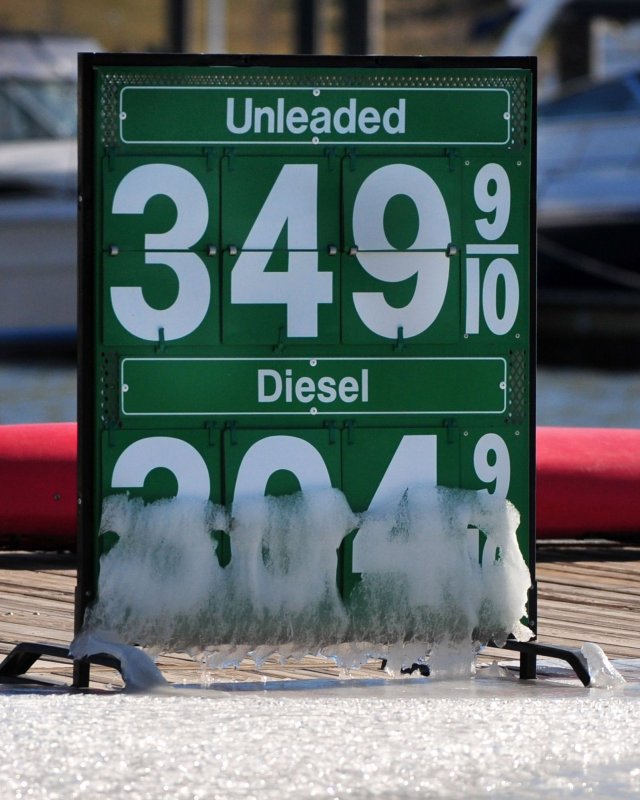A sign displaying gas prices covered in ice is seen at the National Harbor in Maryland on December 24, 2010. The national average price for a gallon of gas is above $3 for the first time since 2008 and is the highest ever for the holiday season. UPI/Kevin Dietsch |
License Photo
LONDON, Jan. 11 (UPI) -- Crude oil prices of $90 a barrel or more are too high to help global economic recovery, the London Center for Global Energy Studies said in its latest Energy Outlook.
Organization of Petroleum Exporting Countries members' oil ministers met in Ecuador last month and decided the world economy could absorb $90 a barrel -- or even $100 a barrel. Venezuela and a few other cash-strapped OPEC members actively pushed for a higher price but were voted down by other members anxious not to turn global public opinion against the group.
Although OPEC has less control on supply and price of crude oil than it did a decade ago, mainly because of rising non-OPEC output, its word is received as command by energy markets where traders themselves are not averse to profiteering on the back OPEC decisions.
The center said, "despite OPEC insisting otherwise, the CGES is still of the view that $90/bbl oil could prove too expensive for the global economy at this stage of the recovery, especially given the fragile nature of many governments' balance sheets."
OPEC ministers heard similar arguments when they met Dec. 11 in Quito, Ecuador, but remained strident in their view the oil price could go higher without hurting anyone.
OPEC members accused by their opposition critics of mismanaging their economies, including Venezuela and Iran, were most vociferous in their demands for higher -- even $100 a barrel -- oil prices.
CGES cautioned against too strong support for higher oil prices because that could negate early signs of a recovery.
"The macroeconomic picture continues to improve gradually and this has helped ensure that there has been so far no significant fall in prices after the rally in the final few months of last year, despite a strengthening U.S. dollar," CGES said.
It said the U.S. labor market is showing "some signs of life," with the non-farm payroll data for December containing what it called "mildly positive figures" for the private sector.
The center's study warned against too much optimism that the oil price spike could last.
The oil market began 2011 confident the price rise was justified.
"In our view this confidence is in large part due to a tightening of the fundamentals -- in particular, rising global oil demand in 3Q10 and 4Q10 and OPEC's reluctance to supply more crude -- but it is still quite possible that events in the wider global economy could take some of the wind out of the oil market's sails."
Several events could put renewed pressure on the oil price, it said, citing possibilities that winter in the northern hemisphere won't be as severe as originally anticipated, the U.S. oil inventories will continue to build and the dollar will continue to recover.
CGES also warned analysts and traders against reading too much in recent output spikes. Nigeria and Saudi Arabia pumped more oil in December than expected but Nigeria's rise is probably the result of the completion of repair work on pipelines damaged by groups stealing oil from pipelines.
Saudi Arabia's increase may be part of a moderating effort. "However, it is too early to determine whether the Saudi rise is really an effort to bring oil prices down from their current highs or just a temporary uptick," said the think tank.















